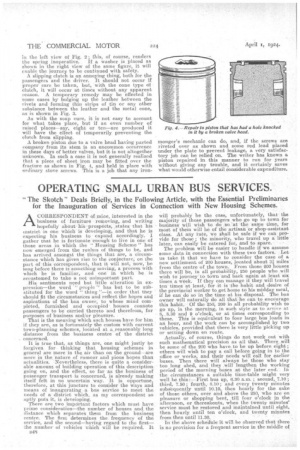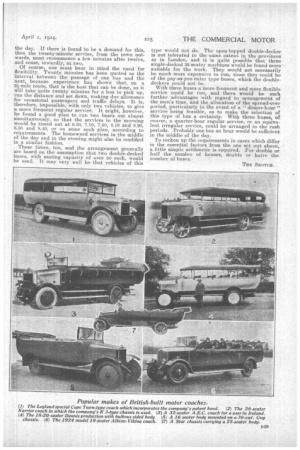OPERATING SMALL URBAN BUS SERVICES.
Page 42

Page 43

If you've noticed an error in this article please click here to report it so we can fix it.
The Skotch " Deals Briefly, in the Following Article, with the Essential Preliminaries for the Inauguration of Services in Connection with New Housing Schemes.
ACORRESPONDENT of :mine, interested in the business of furniture reinoving, and writing hopefully' about hiS-prospeets; :states that his oistrict is one which is developing, 'and that he is expecting his business to expand accordingly. • I gather that he is fortunate enough' to Hire in one of those areas in which the " Housing Scheme" has now emerged from the realms of things to be, and has arrived amongst the things that are, a circumstance which has given rise to the conjecture, on the part of this cerrespolident, that it will not, now, be long before there is something moving, a process With which he is familiar, and one in which he is accustomed to takea not unimportant part.
. Hissentiments need but little alteration in expression—the word " People " has but to be substituted for the word " thing "—in order that they should fit the circumstances and reflect the hopes and aspirations 'of the bus owner, to whose mind completed, furnished and Occupied' houses connote passengers to be carried thereto 'and therefrom, for purposes of business and/or pleasure. •
That is the meaning 'which such 'houses have for him if they are, as is fortunately the custom with current town-planning schemes, located at a..reasonably long distance from the business centre of the district
concerned. •
it is true that, as things .are, one might justly be forgiven for thinking that housing schemes in general are more in the air than on the ground—are more in the nature of rumour and pious hopes than actualities. Nevertheless, there is quite a considerable amount of building operation of this description going on, and the effect, so' far as the business of passenger transport is concerned, is already making itself felt in no uncertain :way. It is opportune, therefore, at, this juncture to consider• the ways and means of inaugurating a bus service to meet the needs of a district which, as my correspondent so aptly puts it, is developing.
There are two impertant factors which must have prime consideration—the number of houses and, the distance which separates them from the business centre. The first determines the. frequency of the service, and the second—having regard to the first— :he number of vehicles which will be required. It D48
will probably; be the case, unfortunately, that the majority of those passengers who go up to town for business will wish to do So at the same time, for most of 'them will be of the artisan 'or shop-assistant class. At any rate, we shall he safe if we can provide for those ; • the minority, who travel up a little later, can easily be catered for, and to spare. The problem will be easier to handle if we assume some data in connection with these two factors. Let us take it that we have to consider the case of a new settlement of 200 houses, located about 3 miles from the centre 'of the town. From those 200 houses there will be, in all probability, 250 people who will wish to' journey 'to. town and back again at least six times a week. If they can Manage it they will travel ten' times at least,for it .is 'the habit and desire of the provincial worker to get home to his midday meal, if he can do so in the time at his disposal. The bus owner will naturally do 'all that he canto encourage this habit.' Of• the 250, 200 in all probability wish to go up, in the morning, in such style as to arrive at 8,. 8.30 and 9 o'clock, or at times corresponding to these. This is equivalent to four large bus loads in an hour, and the work can be accomplished by two vehicles, provided that there is very little picking up or setting down en route.
Actually, of course, things do not work out with such mathematical precision as all that. There will be seine of the 200 who have, to be up before eight ; others will wish to pay a call before going in to the office or works,' and their needs will call for earlier buses. Then there Will always be those who stay too long abed, and they will lengthen the working period of the Morning buses at the later end:. In the circumstances a suitable time-table might very well be this : —First bus up, 6.30 a.m. ; second,..7.10; third, 7.50 ; fourth, 8.10; and every twenty minutes subsequently until 10.10, then hourly for the sake of those others, over and above the 250, 'who are on pleasure or shopping bent, .till four o'clock in the afternoon, or thereabouts, when the twenty minutes' service must be restored and inaintained.until eight, then hourly. until ten o'clock, and twenty minutes from then until 11.30.
In the above schedule it will he Observed-that there is no provision for a frequent service in the middle of
the day. If there is found to be a demand for this, then the twenty-minute service, from the town outwards, must recommence a few minutes after twelve, and cease, inwardly, at two. Of course, one must bear in mind the need for flexibility. Twenty minutes has been quoted as the interval between the passage of one bus and the next because experience has shown that, on a *mile route, that is the best that can be done, as it Will take quite twenty minutes for a bus to pick up, run the distance and set down, making due allowance for occasional passengers and traffic delays. It is, therefore, impossible, with only two vehicles, to give a more frequent regular service. It might, however, be found a good plan to run two buses out almost simultaneously, so that the services in the morning would be timed out at 6.30, 7.10, 7,50, 8.10 and 8.20, 8.30 and 8.40, or on some such plan, according to requirements. The homeward services in the middle of the day and in the evening might also be modified in a similar fashion.
These times, too, and the arrangement generally are based on the assumption that two double-decked buses, with seating capacity of over 50 each, would be used. It may very well be that vehicles of this
type would not do. The open-topped double-decker is not tolerated to the •saine extent in the provinces as in London, and it is quite possible that three single-decked 32-seater machines would be found more suitable for the work. They would not necessarily be much more expensive to run, since they could be of the pay-as-you-enter type buses, which the doubledeckers could not be.
With three buses a more frequent and more flexible service could be run, and there would be. such further advantages with regard to arrangement of the men's time, and the allocation of the spread-over period, particularly in the event of a " dinner-hour" servicei being feasible, as to make the selection of this type of bus a certainty. With three buses, Of course, a quarter-hour regular service, or an equivalent irregular service, could be arranged in the rush periods. Probably one bus an hour would be sufficient in the middle of .the day.
To reckon up the requirements in cases which differ in the essential factors from the one set out above, a little simple arithmetic is required. For double or half the number of houses, double or halve the number of buses.
THE SKOTCH.






















































